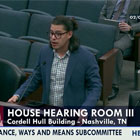The state of Tennessee has considered sound money legislation in each of the last seven years. Championed by Rep. Bud Hulsey, HB 1874 would finally remove the sales tax on gold and silver coins and bullion currently levied in the Volunteer State.
At a hearing yesterday in Nashville, Jp Cortez, policy director of the Sound Money Defense League, testified on behalf of sound money advocates and precious metals investors across the state, in support of HB 1874.
Written testimony (slightly different from spoken testimony) is below:
Chairman Hicks, members of the Finance, Ways, and Means House Subcommittee, thank you for the opportunity to testify before you today.
My name is Jp Cortez and I am the policy director for the Sound Money Defense League. I ask you to please vote YES on House Bill 1874, a measure that removes sales taxation from gold and silver coins and bullion.
Just two months ago the Tennessee Advisory Commission on Intergovernmental Relations released a report on the feasibility of creating a state gold depository.
While the report concluded that a bullion depository would not be feasible in Tennessee at this time, TACIR pointedly concluded that the state should consider a sales tax exemption from precious metals coins and bullion.
There is a national trend to remove sales taxation from precious metals. According to TACIR’s report, 42 states have already done so in whole or in part. Mississippi, Hawaii, Kentucky, and New Jersey are expected to consider measures to remove sales taxation from precious metals in the upcoming weeks.
Tennessee has considered measures similar to House Bill 1874 for seven years. While it has failed so far to pass this common-sense measure, six other states have ended the practice of taxing precious metals over the same amount of time. (WV, OH, LA, NC, KS, AR)
Under current law, Tennessee citizens are discouraged from insuring their savings against the devaluation of the dollar because they are penalized with taxation for doing so. House Bill 1874 removes the disincentives to holding gold and silver for this purpose. Here are a few reasons why I strongly urge you to vote YES on House Bill 1874:
-Taxing gold and silver is a de facto investment penalty on Tennessee citizens (usually of humble means) who seek to hold some of their savings in real assets that are insulated from inflation and financial turmoil. It’s also discriminatory because purchases of stocks, bonds, mutual funds, ETFs, real estate, and every other financial instrument are not subject to sales tax.
From the TACIR Report: “Anyone buying and storing precious metals in Tennessee owes Tennessee’s sales tax, and state and local rates combined can be as high as 9.75%”
-Purchasers of precious metals are not “consuming” them, making a sales tax and/or use tax inappropriate in the first place. Precious metals purchasers are holding these metals for resale or exchange, like a currency or investment.
The exchange of one dollar for four quarters is a nontaxable event. Exchanging dollars for the only form of money mentioned in the U.S. Constitution should not be taxed.
Taxing the purchase of monetary metals also undermines Tennessee businesses (and reduces Tennessee state revenues). Many Tennesseans will buy and/or store their precious metals in nearby Alabama, Georgia, Missouri, North Carolina, and Virginia, which do not charge sales tax on precious metals.
Studies have shown that states lose revenue when they tax the purchase of gold and silver. Washington and Nebraska considered repealing longstanding exemptions on precious metals in their states but legislators realized the major policy error this would entail and the measure didn’t make it out of committee in either state.
Louisiana and Ohio both briefly imposed a sales tax on precious metals recently – but the legislatures in both states quickly reversed course after one year when businesses, coin conventions, and state revenues left the state.
That’s why any revenue collected from precious metals sales taxes would almost certainly be surpassed by the tax revenue lost from coin conventions, businesses, and other economic activity leaving the state.
By voting yes on House Bill 1874, you will be following an example set by 42 other states which have already reduced or eliminated sales taxes on precious metals, honoring the only form of money mentioned in the U.S. Constitution, and lowering the tax burden on your constituents.

About the Author:
Jp Cortez is a graduate of Auburn University and a resident of Charlotte, North Carolina. He is the Executive Director of the Sound Money Defense League, an organization working to remonetize gold and silver through nationwide legislative efforts. Follow him on X (Twitter) @JpCortez27.





